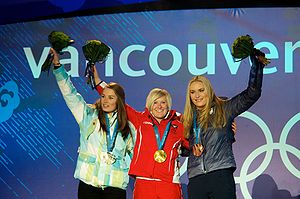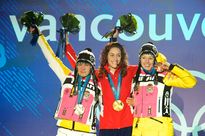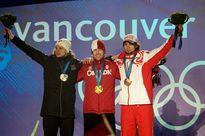2010 Winter Olympics medal table

The 2010 Winter Olympics, officially known as the XXI Olympic Winter Games, was a winter multi-sport event held in Vancouver, British Columbia, Canada, from February 12 to February 28. A total of 2,632 athletes representing 82 National Olympic Committees (NOCs) participated in 86 events from 15 different sports and disciplines.[1]
Athletes from 26 NOCs won at least one medal, and athletes from 19 of these NOCs secured at least one gold. For the first time, Canada won a gold medal at an Olympic Games it hosted, having failed to do so at both the 1976 Summer Olympics in Montreal and the 1988 Winter Olympics in Calgary. In contrast to the lack of gold medals at these previous Olympics, the Canadian team finished first overall in gold medal wins,[2] and became the first host nation—since Norway in 1952—to lead the gold medal count, with 14 medals. In doing so, it also broke the record for the most golds won by a NOC at a single Winter Olympics (the previous was 13, set by the Soviet Union in 1976 and matched by Norway in 2002).[3] The United States placed first in total medals—its second time doing so in a Winter Games—and set a new record for most medals won by a NOC at a single Winter Olympics, with 37 (the previous record was 36, established by Germany in 2002).[2] Athletes from Slovakia and Belarus won the first Winter Olympic gold medals for their nations.[4][5]
Cross-country skier Marit Bjørgen from Norway won five medals (three gold, one silver, one bronze), more than any other athlete. Chinese short track speed skater Wang Meng tied Bjørgen for the lead in gold medals, with three.[6]
Contents |
Medal table
|
| IOC · COC · VANOC |


The medal table is based on information provided by the International Olympic Committee (IOC) and is consistent with IOC convention in its published medal tables. By default, the table is ordered by the number of gold medals the athletes from a nation have won (in this context, a nation is an entity represented by a National Olympic Committee). The number of silver medals is taken into consideration next and then the number of bronze medals. If nations are still tied, equal ranking is given and they are listed alphabetically.
In the men's individual event in biathlon, two silver medals were awarded for a second-place tie. No bronze medal was awarded for that event.[7]
Host nation (Canada)
- To sort this table by nation, total medal count, or any other column, click on the
 icon next to the column title.
icon next to the column title.
| Rank | Nation | Gold | Silver | Bronze | Total |
|---|---|---|---|---|---|
| 1 | 14 | 7 | 5 | 26 | |
| 2 | 10 | 13 | 7 | 30 | |
| 3 | 9 | 15 | 13 | 37 | |
| 4 | 9 | 8 | 6 | 23 | |
| 5 | 6 | 6 | 2 | 14 | |
| 6 | 6 | 0 | 3 | 9 | |
| 7 | 5 | 2 | 4 | 11 | |
| 7 | 5 | 2 | 4 | 11 | |
| 9 | 4 | 6 | 6 | 16 | |
| 10 | 4 | 1 | 3 | 8 | |
| 11 | 3 | 5 | 7 | 15 | |
| 12 | 2 | 3 | 6 | 11 | |
| 13 | 2 | 1 | 0 | 3 | |
| 14 | 2 | 0 | 4 | 6 | |
| 15 | 1 | 3 | 2 | 6 | |
| 16 | 1 | 1 | 3 | 5 | |
| 17 | 1 | 1 | 1 | 3 | |
| 17 | 1 | 1 | 1 | 3 | |
| 19 | 1 | 0 | 0 | 1 | |
| 20 | 0 | 3 | 2 | 5 | |
| 21 | 0 | 2 | 1 | 3 | |
| 21 | 0 | 2 | 1 | 3 | |
| 23 | 0 | 2 | 0 | 2 | |
| 24 | 0 | 1 | 4 | 5 | |
| 25 | 0 | 1 | 0 | 1 | |
| 25 | 0 | 1 | 0 | 1 | |
| Total | 86 | 87 | 85 | 258 | |
See also
References
- General
- "Olympic Medals: Gold, Silver, Bronze". Vancouver 2010 Winter Olympics. Vancouver Organizing Committee. http://www.vancouver2010.com/olympic-medals/. Retrieved 2010-02-13.
- Specific
- ↑ "The Vancouver 2010 Olympic Winter Games: By the numbers". Vancouver 2010 Winter Olympics. VANOC. http://www.vancouver2010.com/olympic-news/n/news/the-vancouver-2010-olympic-winter-games-by-the-numbers_297556Ko.html. Retrieved 2010-03-01.
- ↑ 2.0 2.1 "U.S. clinches medals mark, Canada ties gold record". The Washington Times. The Associated Press (Vancouver). 2010-02-27. http://www.washingtontimes.com/news/2010/feb/27/us-clinches-medals-total-canada-most-golds/.
- ↑ Canadian Press (2010-02-27). "Canada sets Olympic gold record". CBC Sports. http://www.cbc.ca/olympics/story/2010/02/27/sp-canada-gold-otp.html?ref=rss. Retrieved 2010-02-27.
- ↑ "Anastazia Kuzmina wins Slovakia first winter crown". The Australian. 2010-02-14. http://www.theaustralian.com.au/news/sport/anastasiya-kuzmina-wins-slovakia-first-winter-crown/story-e6frg7mf-1225830166112. Retrieved 2010-02-21.
- ↑ Charles, Deborah (2010-02-26). "Grishin Grabs First Gold For Belarus". Reuters. http://www.reuters.com/article/idUSN2515105720100226. Retrieved 2010-03-23.
- ↑ Clarey, Christopher (2010-02-28). "Fighting Finish to the Comeback Olympics". The New York Times. http://www.nytimes.com/2010/03/01/sports/olympics/01iht-olyarena.html. Retrieved 2010-03-08.
- ↑ Morris, Jonah (2010-02-18). "Svendsen seals golden sweep for Norway". CTV Olympics. http://www.ctvolympics.ca/biathlon/news/newsid=45644.html. Retrieved 2010-02-18.
External links
- Vancouver 2010 at Olympic.org
|
|||||||||||